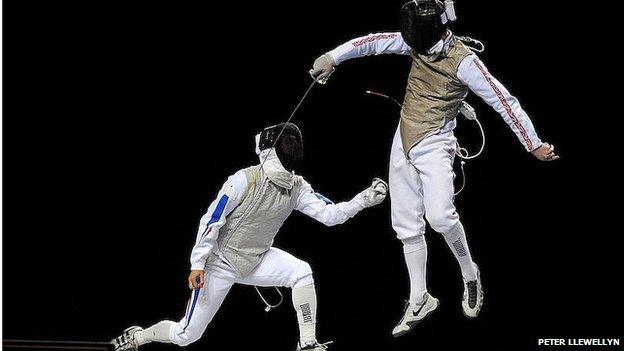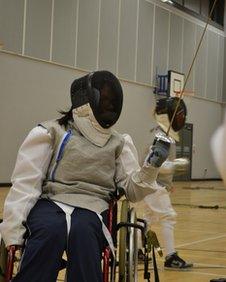Fencing expert Keith Cook says sport is for all
- Published

Scottish fencing champion Keith Cook (right) wants fencing to be open to all
An international battle is taking place in Edinburgh on Saturday, as a Scottish fencing team takes on a group of world-class swordsmen from Poland in an exhibition match. As a sport, fencing is often seen as the preserve of the elite, but the organisers of the event want to change that view and encourage people from all backgrounds and ages to take part.
Shrouded in white protective gear, their faces covered by masks, two opponents face each other - swords drawn.
"En garde, ready, fence," says the referee.
Fast movements here are key, but it is also about making your opponent react, as much about strategy as physical condition.
"It's natural play," says five times Commonwealth Games medallist, Keith Cook, who is one of those behind this club, which takes places at a school in Edinburgh.
He says: "When a kid picks up a stick outside, they think it's a sword."
Cook's first sporting loves were boxing and football but when he was introduced to fencing by a friend of a friend, he was "mesmerised" by it.
"I come from a disadvantaged area of Edinburgh called Pilton," he says.
"Not many people do fencing in Pilton."
"I was able to focus on fencing and not worry about what was going on in family life or at school, because I wasn't that good at school. I didn't like maths or English because I was dyslexic. Fencing was a gateway for me to channel my energies in a positive way."
As a warm up before the action itself, club members jog around the gym and loosen themselves up with flexibility exercises. This particular club has lots of younger members.

Karen Sutherland competes from her wheelchair
"It's like what you see in the movies, Lord of the Rings and Zorro and that," says one 15-year-old boy, who has been fencing for five years.
"It's really action-packed, exciting to play rather than football or something. It can get quite competitive and heated but you're always friends with the person after."
But what about the image of fencing? The sports governing body, Scottish Fencing, says it is an activity which "attracts people from all walks of life (contrary to the image sometimes seen in films)".
Keith Cook adds that in continental Europe, where he has trained, fencing is viewed as a sport for everyone, something he would like to be emulated here. He points to work he is doing in schools.
He says: "You see it a lot in private schools, but for me I'm going into, not just private schools, but state schools as well and showing them that it doesn't matter where you come from, you can do fencing.
"When you've got a sword in your hand and you're in front of someone it doesn't matter where you come from, if you have the money, if you don't have the money, if you can spell, if you can't spell, if you can put your skills that you've been practising together, fencing one on one - the one that's been training the most, wins."
Amidst all the noise and clatter, at one end of the hall two opponents, are fighting sitting down.
One of them is Karen Sutherland, who is in a wheelchair. She had tried a number of different sports before coming to the club, but was looking for something more competitive.
"Doing fencing has helped with motivation levels as well as the physical side," she says, but it is also the first sport she has done which has involved a mixture of able-bodied and people with a disability.
"One thing I've found with fencing is that because you're fencing people of all sorts of different abilities you're sort of pushing yourself more to try things that you otherwise wouldn't."
You can hear more about this on the Saturday edition of BBC Scotland's Good Morning Scotland programme - 08:00-10:00.